- Головна
- Готові шкільні презентації
- Презентація на тему «Salvador Dali» (варіант 3)
Презентація на тему «Salvador Dali» (варіант 3)
235
Слайд #1
Prepared by: Shevchenko Eleonora
Salvador Dalí
Salvador Dalí

Слайд #2
Salvador Dalí
Spanish artist and Surrealist icon Salvador Dalí is perhaps best known for his painting of melting clocks, The Persistence of Memory. Dalí was a skilled draftsman, best known for the striking and bizarre images in his surrealist work.
Spanish artist and Surrealist icon Salvador Dalí is perhaps best known for his painting of melting clocks, The Persistence of Memory. Dalí was a skilled draftsman, best known for the striking and bizarre images in his surrealist work.
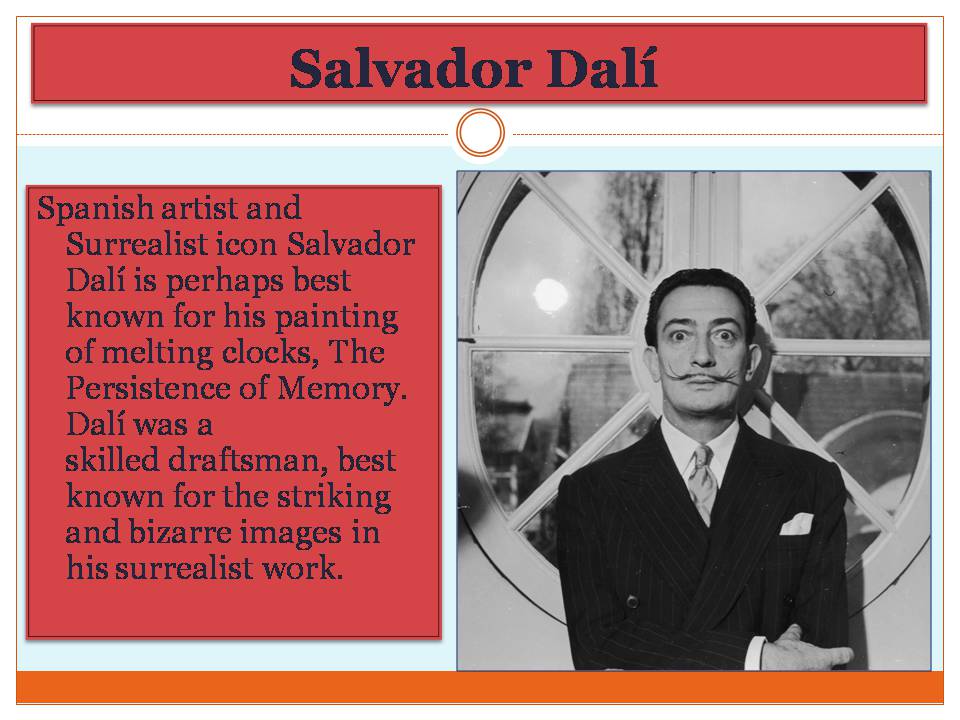
Слайд #3
Dalí was highly imaginative, and also enjoyed indulging in unusual and grandiose behavior.
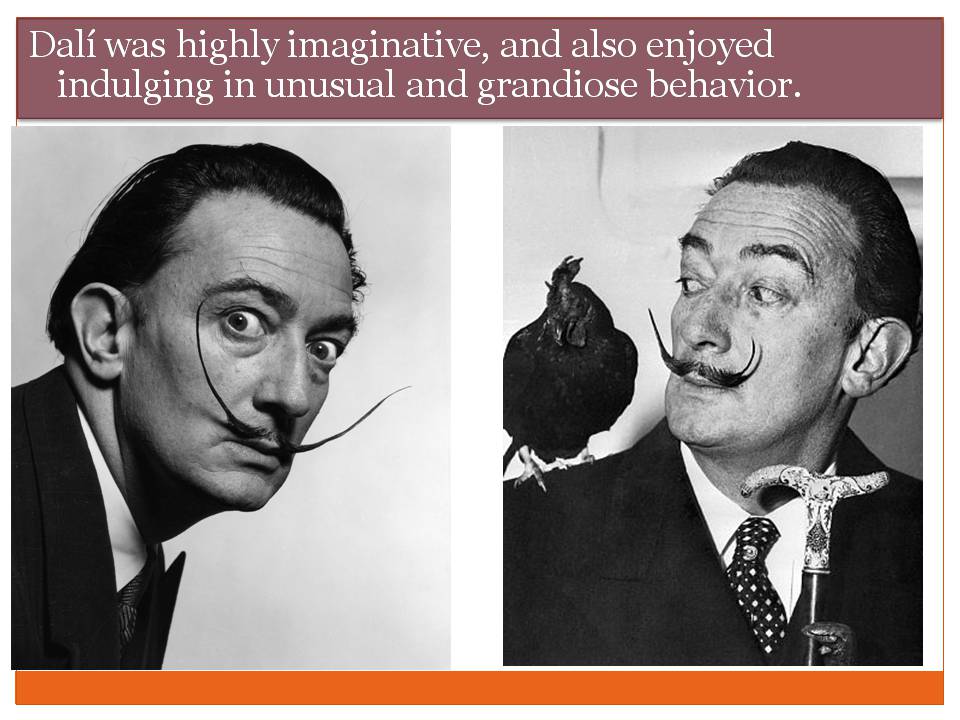
Слайд #4
Dalí was highly imaginative, and also enjoyed indulging in unusual and grandiose behavior.
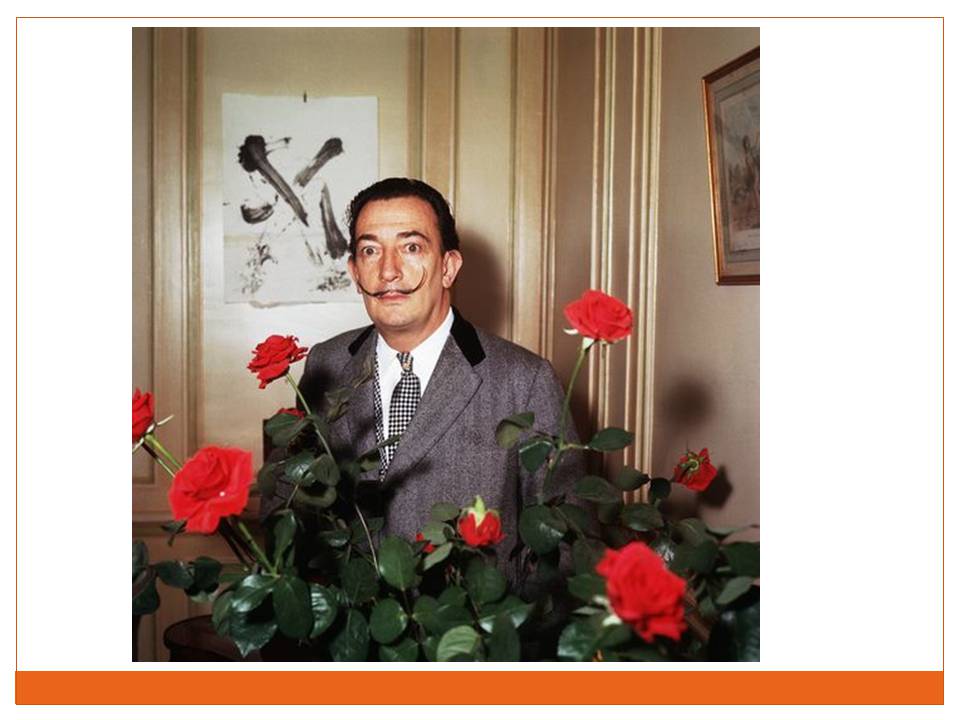
Слайд #5
A Colombian ocelot called Babou.
Dalí and Babou at the St. Regis hotel, New York where Dalí had a suite, 1965
One of the most popular accounts of Dalí and Babou is that of the painter bringing the wild cat into a Manhattan restaurant .
Dalí and Babou at the St. Regis hotel, New York where Dalí had a suite, 1965
One of the most popular accounts of Dalí and Babou is that of the painter bringing the wild cat into a Manhattan restaurant .
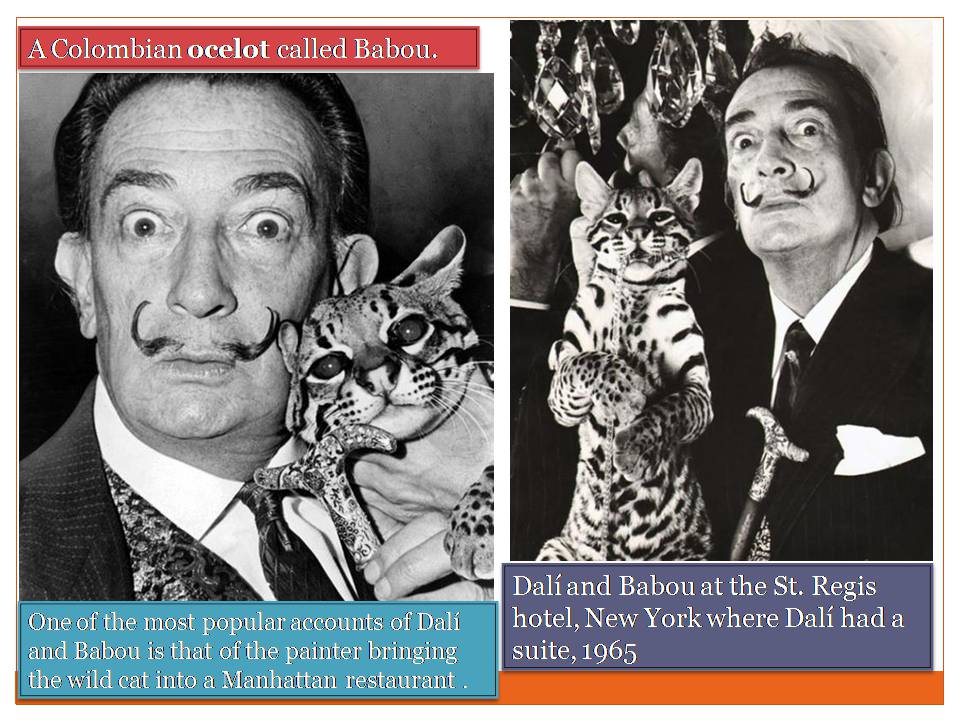
Слайд #6
Art School
Salvador Dalí was born on May 11, 1904, in Figueres, Spain. From an early age, Dalí was encouraged to practice his art and would eventually go on to study at an academy in Madrid. Dalí was expelled from the Academia in 1926, shortly before his final exams when he was accused of starting an unrest.
In art school, Dalí began exploring many forms of art including classical painters like Raphael, Bronzino and Diego Velázquez (from whom he adopted his signature curled moustache). He also dabbled in avant-garde art movements such as Dada.
Salvador Dalí was born on May 11, 1904, in Figueres, Spain. From an early age, Dalí was encouraged to practice his art and would eventually go on to study at an academy in Madrid. Dalí was expelled from the Academia in 1926, shortly before his final exams when he was accused of starting an unrest.
In art school, Dalí began exploring many forms of art including classical painters like Raphael, Bronzino and Diego Velázquez (from whom he adopted his signature curled moustache). He also dabbled in avant-garde art movements such as Dada.
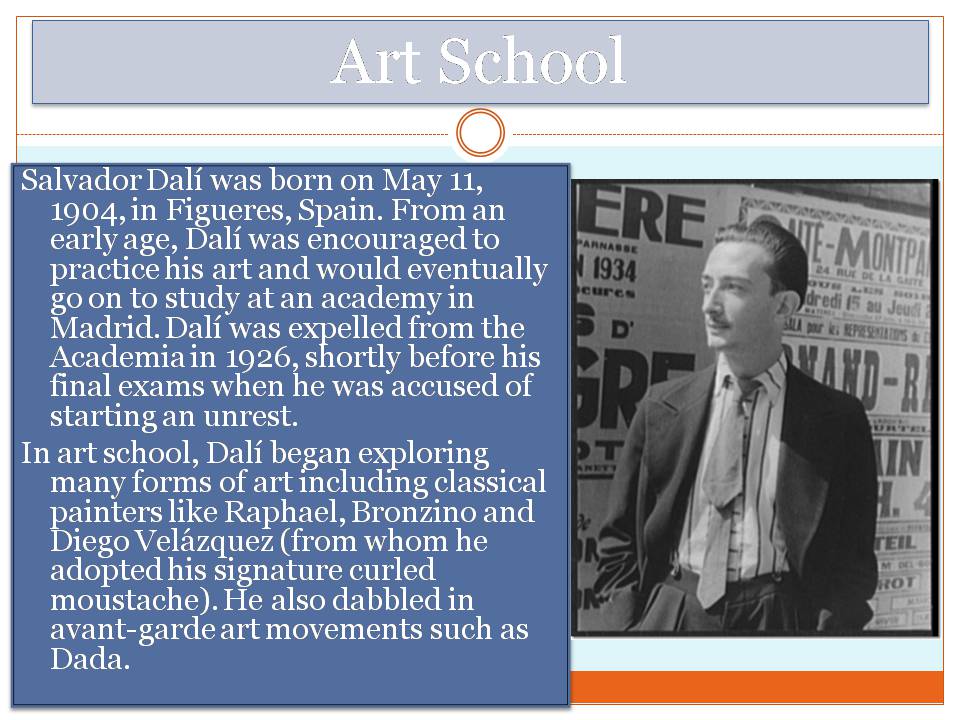
Слайд #7
Art
Dalí was working with styles of Impressionism, Futurism and Cubism. Dalí's paintings became associated with three general themes:
man's universe and sensations,
sexual symbolism
ideographic imagery.
All of this experimentation led to Dalí's first Surrealistic period in 1929.
Dalí was working with styles of Impressionism, Futurism and Cubism. Dalí's paintings became associated with three general themes:
man's universe and sensations,
sexual symbolism
ideographic imagery.
All of this experimentation led to Dalí's first Surrealistic period in 1929.
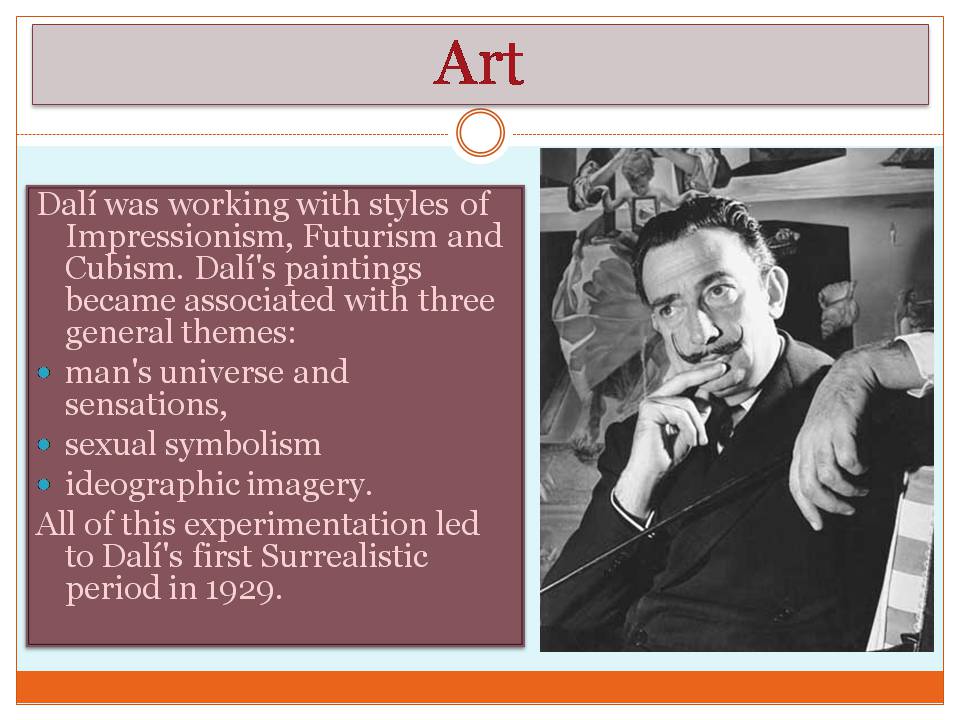
Слайд #8
One of Dalí's most famous paintings produced at this time—and perhaps the best-known Surrealist work—was The Persistence of Memory (1931). The painting, sometimes called Soft Watches, shows melting pocket watches in a landscape setting. It is said that the painting conveys several ideas in the image, chiefly that time is not rigid and everything is destructible.
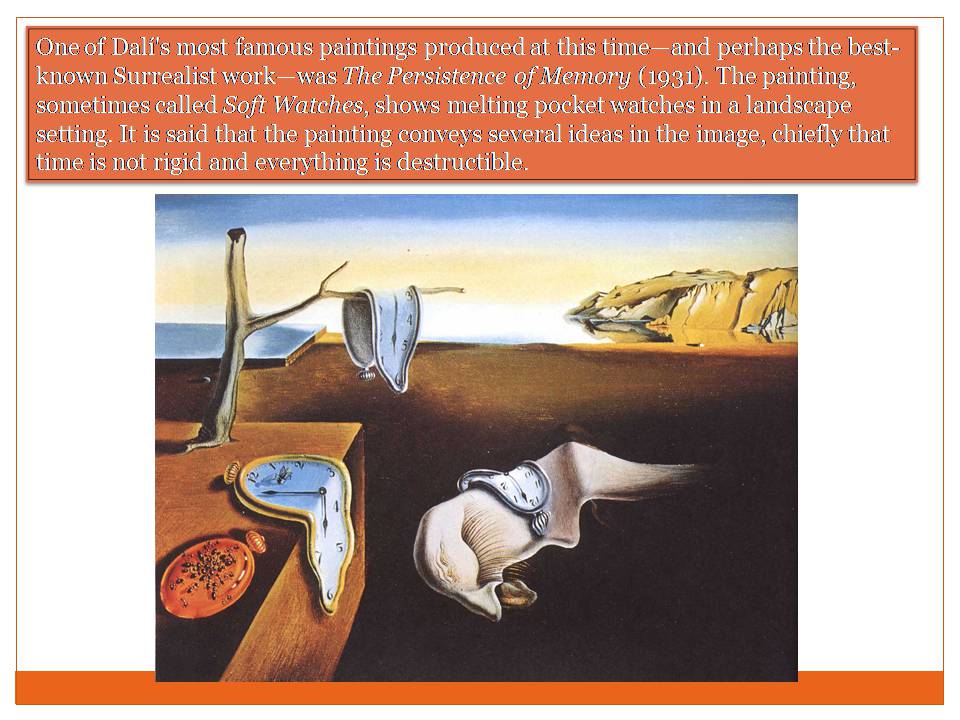
Слайд #9
Dream Caused by the Flight of a Beearound a Pomegranate a Second Before Awakening
The elephants
The elephants
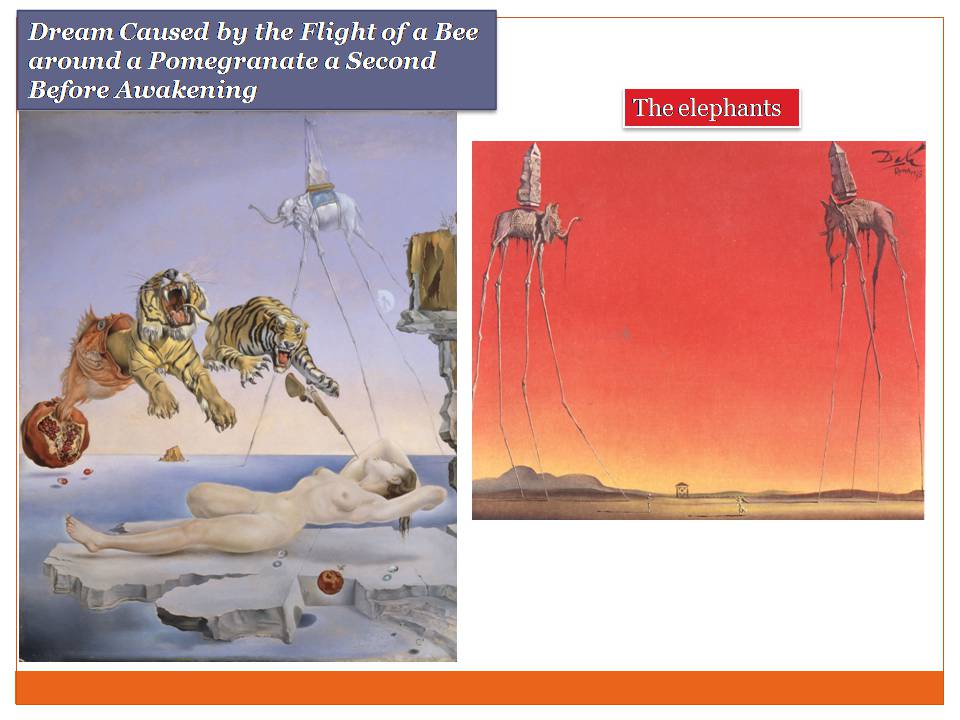
Слайд #10
My wife, naked looking at her own body, which is transformed into steps, three vertebrae of a column, sky and architecture.
Enigmatic Elements in a Landscape.
Enigmatic Elements in a Landscape.
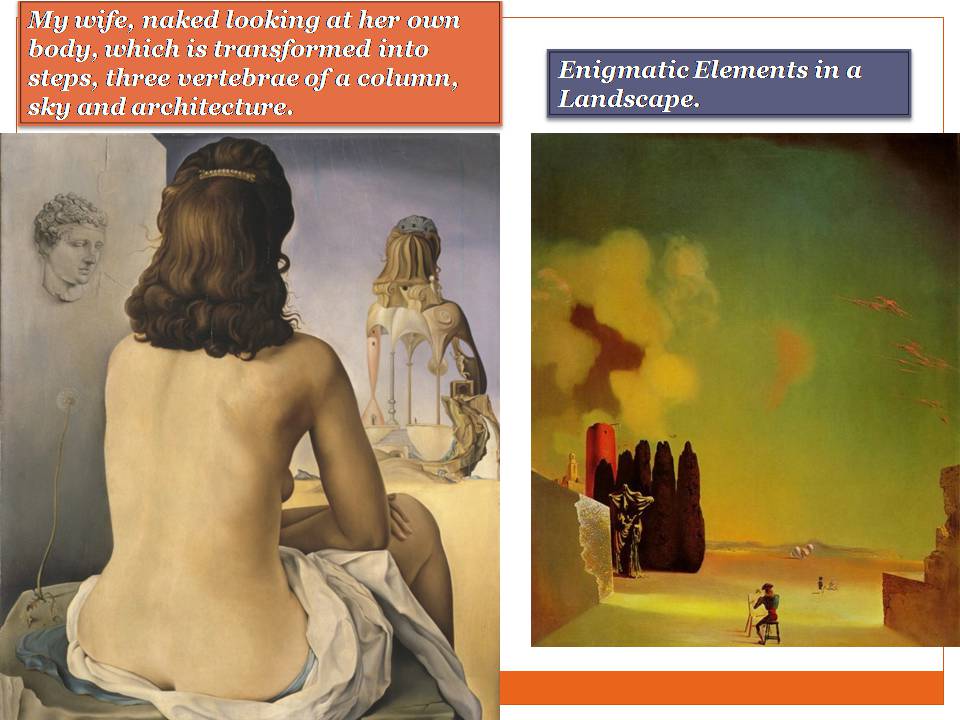
Слайд #11
Study for ‘Honey is Sweeter than Blood'
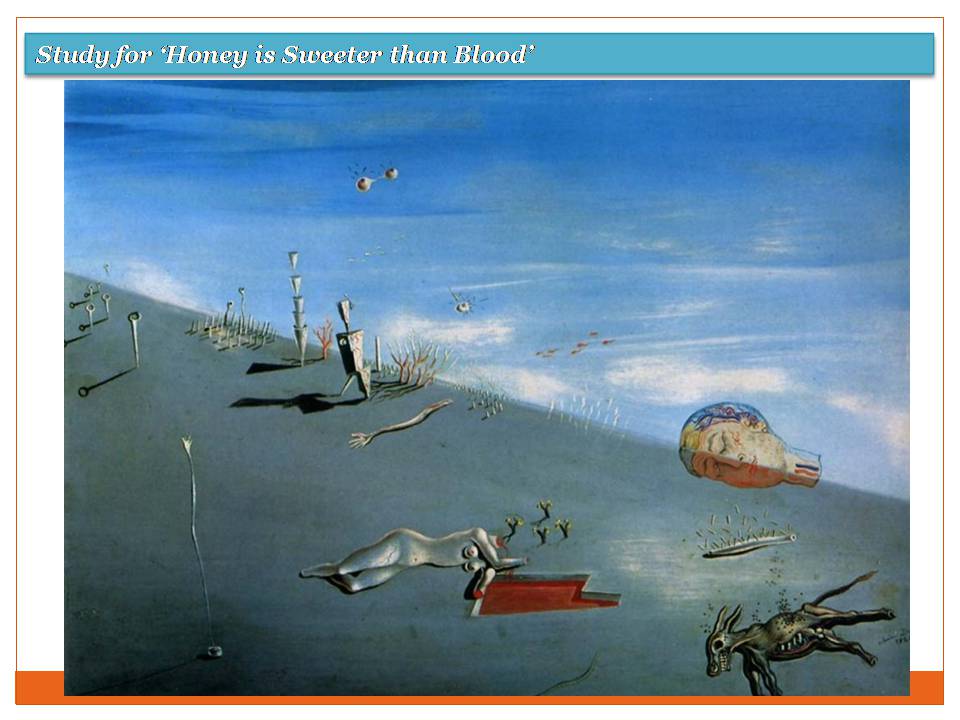
Слайд #12
Necrophiliac springtime
Set in a barren desolate desert, the type of landscape Dali preferred in many of his works, Printemps necrophilique, or Necrophiliac springtime stands as an allegory for the painter's paranoia, his conscience shifting toward illusion. Painted in 1936, Printemps necrophilique depicts a seated seated man and a flower-headed woman on the left, separated by a cypress tree, the woman looking toward the viewers, while the man gazes at the blurred landscape. The desert slowly fades from hyperrealistic to hallucinatory.
Set in a barren desolate desert, the type of landscape Dali preferred in many of his works, Printemps necrophilique, or Necrophiliac springtime stands as an allegory for the painter's paranoia, his conscience shifting toward illusion. Painted in 1936, Printemps necrophilique depicts a seated seated man and a flower-headed woman on the left, separated by a cypress tree, the woman looking toward the viewers, while the man gazes at the blurred landscape. The desert slowly fades from hyperrealistic to hallucinatory.
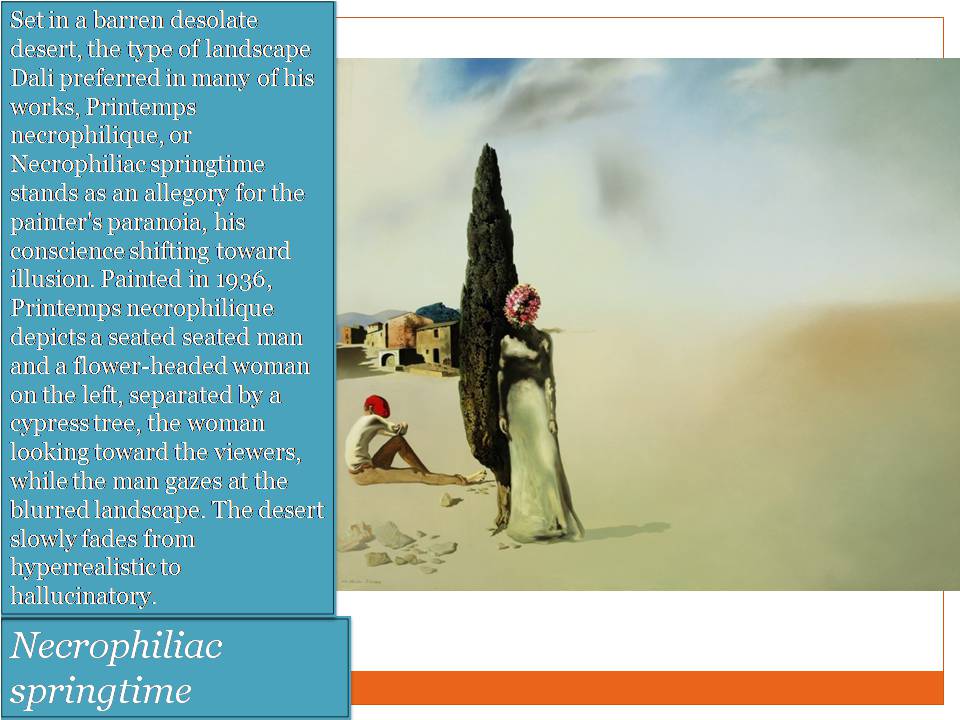
Слайд #13
Necrophiliac springtime
Set in a barren desolate desert, the type of landscape Dali preferred in many of his works, Printemps necrophilique, or Necrophiliac springtime stands as an allegory for the painter's paranoia, his conscience shifting toward illusion. Painted in 1936, Printemps necrophilique depicts a seated seated man and a flower-headed woman on the left, separated by a cypress tree, the woman looking toward the viewers, while the man gazes at the blurred landscape. The desert slowly fades from hyperrealistic to hallucinatory.
Set in a barren desolate desert, the type of landscape Dali preferred in many of his works, Printemps necrophilique, or Necrophiliac springtime stands as an allegory for the painter's paranoia, his conscience shifting toward illusion. Painted in 1936, Printemps necrophilique depicts a seated seated man and a flower-headed woman on the left, separated by a cypress tree, the woman looking toward the viewers, while the man gazes at the blurred landscape. The desert slowly fades from hyperrealistic to hallucinatory.

Слайд #14
